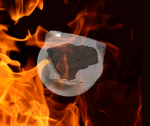Burnt Words

By Ewan
- 303 reads
“Inside”, a Sunday paper teases,
pleases the pseudo-intellectual
with something historical,
something crossing the wide river
between myth and reportage.
Among the burnt words, found
under cooled Vesuvian lava,
are some attributed to “Broadhead¹”,
a former wrestler in Ancient Greece
and grease or oil.
Hooked by this hint at old and classical news,
we turn broadsheet pages, past political rages,
the latest wars by proxy – in the name of Orthodoxy
conducted by descendents of Xerxes and Parthians,
still playing Shah Mat on the chessboard of Mashriq².
We skim reports of murders, the trials of perpetrators
and their victims' relatives; reported in turn
by wringers of hands and ringers of tocsin bells;
recommending the exchange of eyes,
or the understanding that passes all peace
on the road to anarchy.
We find our teased revelation,
words recovered by some modern magic,
from scrolls long buried and burned beforehand.
These words were not written by Plato’s hand,
were they even contemporaneous? Who knows?
They tell of a dinner-party, the host’s displeasure
at a Thracian slave-girl's lack of skill with the flute.
We cannot help the scurrilous thought
that this might be a euphemism.
“It is known “ - weasel words , by whom?
The philosopher’s time as eromenos³
to some or other erastes* is documented,
we pause, finger tracing the lines
of newsprint, and think it a case of “cata-might”.
The past is a mystery,
unsolvable in the present.
The present is a puzzle,
with history's cryptic clues.
Footnotes
- A rough translation of Plato
- Mashriq - Arabic name for the Middle East
- Eremonos – younger male lover of an older man
- *Erastes – the older man referred to above
- Log in to post comments


